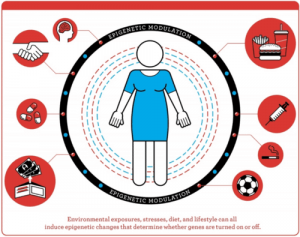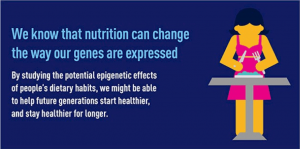
23 Apr Eating Right for the Next Generation (Nutrigenetics)
As parents, we want our children to be healthy and to have the best possible start to life, along with wishing them a successful and happy life.
But, these days how can we be sure our kids are going to stay well, given the alarming rise in the rate of chronic diseases? As mothers, what can we do to keep our children from becoming victims of the global pandemic of obesity and type 2 diabetes?
The truth is, we can do a lot for them, even prior to their birth while they are still in our wombs.
EPIGENETICS OR THE POWER TO CHANGE THE HEALTH OF FUTURE GENERATIONS
Recent research points out that a pregnant women’s diet and lifestyle can shape her child’s lifelong health or cause them to be more disease prone, not only during childhood, but also as an adult. This wide range of potential issues could include anything from cancer or obesity to depression, or even Alzheimer’s disease.

Photo credit: http://www.weightymatters.ca/2015/09/a-interesting-twist-to-epigenetic.html
This is a process scientists have defined as epigenetics. Epigenetics explains how our eating choices and other environmental factors can affect our genes, thus our health and that of our children and future generations. In other words, this science explains how early nutrition and environmental exposure programs long-term health.
Besides a mother’s diet, other factors such as stress, gestational diabetes, smoking or drinking alcohol during pregnancy can have profound effects on your unborn child.
HOW THE MOTHER’S DIET SHAPES HER CHILD’S HEALTH (NUTRIGENETICS)

Photo credit: https://harvardmagazine.com/2017/05/is-epigenetics-inherited
Growth and development of the unborn child are greatly influenced by her mother’s nutrient intake during those 9 months of gestation. What you as a mother-to-be eat, drink, or otherwise take into your body, are all part of the puzzle that spells out the importance of an adequate maternal diet during the nine months journey your baby takes until their birth.
-
MATERNAL NUTRITIONAL STATUS AND FOOD RESTRICTION DURING PREGNANCY
Both overnutrition and undernutrition in the maternal diet have been shown to change the baby’s epigenome. This means that your diet as a mother-to-be can cause your baby’s genes to be altered so they have a predestination of being at major risk for developing obesity, metabolic disorders or various diseases in their childhood or later in life.
For example, studies have shown that children born of an undernourished mother will have a higher incidence of coronary heart disease, a more atherogenic lipid profile, obesity and a weakened immune response. Moreover, they will be more susceptible to some metabolic abnormalities, like hyperglycemia (elevated blood glucose levels).
Together with nutrient deficiency, overnutrition during pregnancy has also been proven to be a risk factor for a range of common problems at early or late stages in life. If the mother is obese, this not only increases the child’s risk of developing obesity in later ages, but also, its associated diseases, like diabetes.
And finally, women who have been diagnosed with GDM – gestational diabetes mellitus – and who are not successfully treated, can actually compromise the intellectual performance and psychomotor development of her baby. That means, it is vitally important that a pregnant woman with GDM needs to be closely monitored by her doctor and Dietitian to prevent developmental issues in her child.
-
NUTRIENTS MATTER!
Both insufficiency or excess of certain nutrients may also have lasting consequences, as they are vital components in a child’s cardiovascular, renal and pulmonary systems to properly function at an adult age.
Your prenatal doctor has likely to have already advised you to take folic acid while you are pregnant, as this supplement has been recommended for quite some time to decrease the risk of neural tube defects.
Supplementation of folate during early pregnancy is associated with increased neurodevelopment, enhanced vocabulary, better communicational skills and better verbal comprehension at 18 months of age. However, if folic acid is taken in late pregnancy, there may be an increased risk for developing asthma and some allergic diseases in childhood, so be sure to follow your doctor’s orders precisely.
Zinc is another fundamental nutrient, and if a child has a deficiency during intrauterine life and childhood, it may contribute to the development of chronic inflammatory diseases and increase cardiovascular risks. On the contrary, if a mother meets her zinc requirements during pregnancy, this can have an anti-inflammatory effect and protect her child.
And we can’t leave out the importance of mothers to be getting enough Vitamin D, as deficiency during pregnancy has been associated with an increased risk of pre-eclampsia for the mother and an increased risk of developing eczema during the first year of life for her child.
Choline and Vitamin B12 matter too. Choline supports a successful completion of fetal development and maternal low levels of Vitamin B12 are related to an insulin resistant state that can cause your baby to have a higher body fat percentage and more abdominal fat by the time they are 6 years old, increasing the risk of developing type 2 diabetes. Several other studies have linked a low level of Vitamin B12 with an altered immune function and high blood pressure at an adult age.
Long-chain polyunsaturated fatty acids or LCPUFAs are also essential components of the human diet known for their beneficial effects on health, growth and development. They therefore play a key role during pregnancy and future good health for your child. Studies have shown that inadequate intake during pregnancy may result in detrimental effects on fetal programming, mostly related to cardiovascular diseases. On the contrary, if a mother to be has a high intake of LCPUFAs, it is largely known to be associated with protective metabolic effects.
A FINAL WORD
All in all, these findings suggest that specific nutrients at key points of your baby’s development can lead to different and unintended long-term consequences both good and bad for the health of your child before and after birth, and for the rest of their life.
As mothers, we have the power to make better choices about our diet and lifestyle, not only for ourselves, but also for our children. With better lifestyles, we can offer a better prosperous future to our kids.
I hope this has encouraged you to start investing in your children’s future, right from this moment, even before you decide to get pregnant, as you never know exactly when that might occur.

Photo credit: http://www.weightymatters.ca/2015/09/a-interesting-twist-to-epigenetic.html
REFERENCES:
Barua, S. Junaid, MA. Lifestyle, pregnancy and epigenetic effects. Epigenomics. 2015;7(1):85-102.
de Boer A, Bast A, Godschalk R. Dietary supplement intake during pregnancy; better safe than sorry? Regul Toxicol Pharmacol. 2018 Mar 20. pii:S0273-2300(18)30087-4. https://www.ncbi.nlm.nih.gov/pubmed/29567330
Indrio, F., Martini, S., Francavilla, R., Corvaglia, L., Cristofori, F., Mastrolia, S. A., … Loverro, G. (2017). Epigenetic Matters: The Link between Early Nutrition, Microbiome, and Long-term Health Development. Frontiers in Pediatrics, 5, 178. https://www.ncbi.nlm.nih.gov/pubmed/28879172
Ojha S, Fainberg HP, Sebert S, Budge H, Symonds ME. Maternal health and eating habits: metabolic consequences and impact on child health. Trends Mol Med. 2015. Feb;21(2):126-33. https://www.ncbi.nlm.nih.gov/pubmed/25662028
Vanhees K, Vonhögen IG, van Schooten FJ, Godschalk RW. You are what you eat, and so are your children: the impact of micronutrients on the epigenetic programming of offspring. Cell Mol Life Sci. 2014 Jan;71(2):271-85. https://www.ncbi.nlm.nih.gov/pubmed/23892892
Vickers MH. Early life nutrition, epigenetics and programming of later life disease. Nutrients. 2014 Jun 2;6(6):2165-78. https://www.ncbi.nlm.nih.gov/pubmed/24892374
Weinhold, B. (2006). Epigenetics: The Science of Change. Environmental Health Perspectives, 114(3), A160–A167. https://www.ncbi.nlm.nih.gov/pmc/articles/PMC1392256/



Sorry, the comment form is closed at this time.